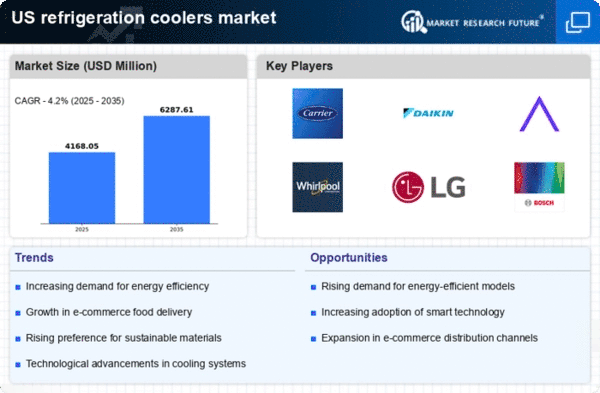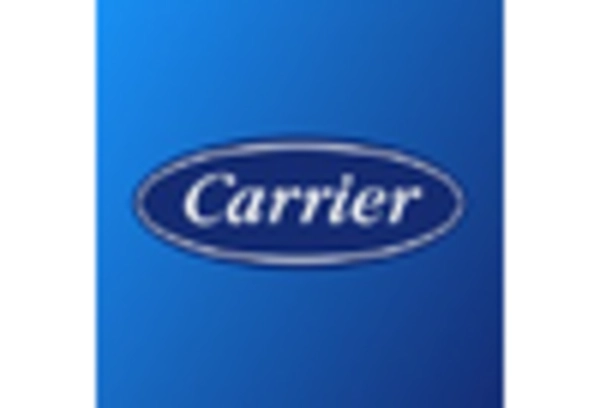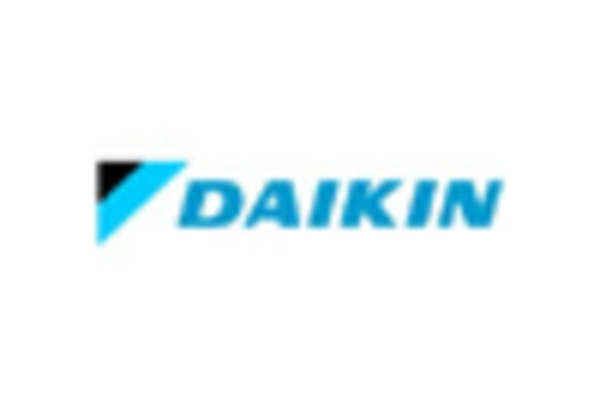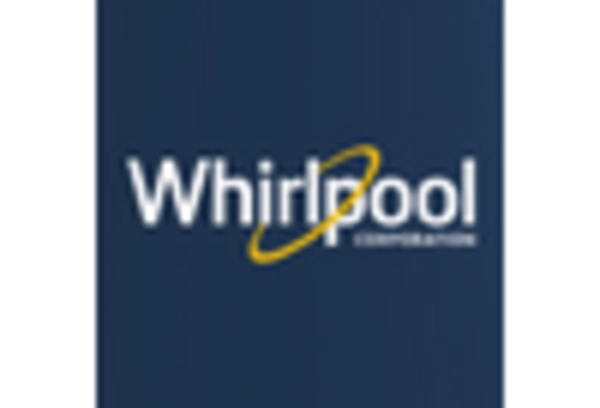Growth in Food and Beverage Sector
The food and beverage sector is a critical driver of the refrigeration coolers market. With the increasing consumption of perishable goods and the expansion of the food service industry, the demand for reliable refrigeration solutions is surging. In 2025, the food and beverage industry in the US is projected to reach a market value of over $1 trillion, which directly correlates with the need for advanced refrigeration systems. This growth is fueled by trends such as online food delivery and the rise of convenience stores, which require efficient cooling solutions to maintain product quality. Consequently, manufacturers are focusing on developing refrigeration coolers that cater specifically to the needs of this dynamic sector, thereby enhancing their market presence.
Regulatory Compliance and Standards
Regulatory compliance is a significant driver in the refrigeration coolers market. As environmental regulations become more stringent, manufacturers are compelled to develop products that meet these standards. In the US, regulations regarding refrigerants and energy efficiency are evolving, pushing companies to innovate and adapt. For instance, the phase-out of certain refrigerants has led to the development of more environmentally friendly alternatives. Compliance with these regulations not only ensures market access but also enhances brand reputation among environmentally conscious consumers. As a result, companies that prioritize regulatory compliance are likely to gain a competitive edge in the refrigeration coolers market, fostering innovation and driving overall market growth.
Rising Demand for Energy Efficiency
The refrigeration coolers market is experiencing a notable shift towards energy-efficient solutions. As consumers and businesses become increasingly aware of environmental impacts, the demand for coolers that minimize energy consumption is rising. According to recent data, energy-efficient refrigeration systems can reduce energy usage by up to 30%, which not only lowers operational costs but also aligns with sustainability goals. This trend is particularly pronounced in commercial sectors, where energy costs represent a significant portion of operational expenses. Manufacturers are responding by innovating technologies that enhance energy efficiency, thereby driving growth in the refrigeration coolers market. The emphasis on energy efficiency is likely to continue, as regulatory frameworks increasingly favor low-energy appliances, further propelling market expansion.
Increased Focus on Health and Safety
The heightened focus on health and safety is emerging as a crucial driver in the refrigeration coolers market. With growing concerns about food safety and hygiene, businesses are investing in advanced refrigeration solutions that ensure optimal storage conditions. The demand for coolers that maintain precise temperature control is increasing, as improper storage can lead to food spoilage and health risks. In 2025, the market for food safety equipment is expected to grow significantly, which will likely boost the refrigeration coolers market as well. Manufacturers are responding by designing coolers that not only meet safety standards but also incorporate features that enhance cleanliness and ease of maintenance. This focus on health and safety is expected to continue shaping consumer preferences and driving demand in the refrigeration coolers market.
Technological Advancements in Refrigeration
Technological advancements are significantly influencing the refrigeration coolers market. Innovations such as smart temperature controls, IoT connectivity, and advanced insulation materials are enhancing the performance and efficiency of refrigeration systems. These technologies not only improve energy efficiency but also provide users with better monitoring and control capabilities. For instance, smart coolers can optimize energy use based on real-time data, potentially reducing energy costs by up to 20%. As these technologies become more accessible, they are likely to attract a broader customer base, including small businesses and residential users. The integration of technology into refrigeration systems is expected to be a key driver of growth in the refrigeration coolers market, as consumers increasingly seek convenience and efficiency.















